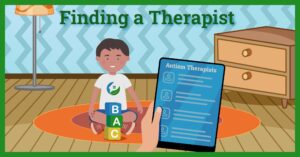
This blog article is part of a series dedicated to Autism Awareness Month. To read the previous article in the series, click here!
Once you’ve determined which type of autism therapy is right for your child, the next step is to find a therapist with the correct specialization. Knowing what to look for and how to assess therapists can be challenging, especially for new parents who are going through this process for the first time.
Understanding your child’s specific needs and preferences is incredibly important for choosing the right therapist, as both you and your child should feel comfortable with their style and personality. While education and previous work experience will also play a role in your decision, there’s more to being a great therapist than a degree.
Exploring ABA Therapy Providers
ABA therapists typically work out of independent practices or as part of larger provider networks – Applied ABC, for example, employs thousands of qualified ABA professionals from around the US, making it easier for families to find a good fit without having to do the legwork alone.
Before you head to Google to search for an ABA therapist in your area, it’s important to understand how this type of autism therapy works. Unlike other autism therapies, ABA relies on a close partnership between two or more specialized providers who serve distinct roles – a Board-Certified Behavior Analyst (BCBA) and a Behavior Technician (BTs).

Board-Certified Behavioral Analyst (BCBA)
Board-Certified Behavioral Analysts (BCBAs) oversee the creation of your child’s personalized treatment plan and ensure it remains tailored to their developmental needs as they grow and learn new skills. They also closely monitor progress and supervise the hands-on ABA therapist that works directly with your child at home, in school, or at an autism center.
To become a BCBA, professionals must first earn a graduate-level degree in behavioral analysis, education, or psychology. Most BCBAs have a background in the mental health field and are specialized in working with children who have developmental delays. While the BCBA doesn’t attend every ABA therapy session, they play an active role in shaping your child’s treatment.
The BCBAs ensures your hands-on Behavior Technician follows the guidelines and best practices of ABA therapy, and that treatment plans are being followed and adapted to your child’s changing needs. BCBAs will also work with parents to administer training so that parents can continue to implement ABA strategies outside of therapy sessions.
Behavior Technician (BT)
Sometimes called “ABA Aides,” Behavior Technicians (BTs) provide direct, hands-on therapy to children diagnosed with autism and other developmental disorders. Using the treatment plan created by the BCBA, your BT will work to decrease maladaptive or disruptive behaviors, increase overall level of functioning, and help your child build the communication and social skills they need to excel.
Throughout ABA therapy sessions, BTs take detailed notes about your child’s behavior, disposition, skill acquisition, and more. This data is the lifeblood of ABA therapy, ensuring your child’s treatment plan is supported by observations and hard data. Once collected and organized, this data is sent to the BCBA for review and treatment plan adjustment.
Registered Behavior Technician (RBT)
Registered Behavior Technicians (RBTs) serve the same essential role as their BT counterparts, providing direct care to children with special needs based on personalized treatment plans. The only difference is that RBTs have earned a higher credential, which requires over 40-hours of coursework, a competency assessment performed by a BCBA, and passing an exam. RBTs are most common in states that require this credential to work with special needs children, such as Georgia and Maryland.

Why Is It So Hard to Find an ABA Therapist?
One reason finding the right ABA therapist can be challenging is that the industry is grappling with a severe shortage of dedicated ABA professionals. According to estimates compiled by Spectrum News, there isn’t a single BCBA in about 54% of US counties – with only around 30,000 Board-Certified Behavioral Analysts in the entire country. From a parent’s perspective, this shortage often translates into long wait times for ABA therapy, especially in areas with a high ratio of children with autism to ABA therapists.
Working with an ABA therapy agency like Applied ABC can reduce wait times and frustration. We’ll help you find the right ABA therapist for your family as quickly as possible, taking your preferences and your child’s needs into account. Applied ABC never puts children on passive wait lists and continues searching for the right ABA therapists until your case is fully staffed.
That said, we deeply believe that parents play an essential role in the ABA therapy process, so it’s important to understand what to look for on your own.
Assessing ABA Therapists: Key Traits to Look For
Along with education, work experience, and other credentials, parents will want to pay close attention to the personality of ABA therapists before making a decision. Helping children with autism decrease disruptive or maladaptive behaviors takes patience, energy, and boundless optimism. These traits are most important in a BT/RBT, as they will be providing hands-on therapy each and every session.
Here are a few key traits every parent should look out for:
-
Organization and timeliness: The ability of your therapist to stay organized is vital to the process of ABA therapy because the information they collect will play a direct role in how your child’s treatment plan evolves. Your BT/RBT should always be on time, barring extraneous circumstances. This is not only a matter of professionalism, as creating a set therapy routine is essential to the consistency that ABA therapy prioritizes.
-
Energy and enthusiasm: Your therapist should approach each session with energy and enthusiasm – having a passion for working with children is often crucial to the long-term effectiveness of ABA therapy. Without this energy and enthusiasm, it will be difficult for the therapist to build rapport with your child and help them overcome behavioral challenges.
-
Patience: Possessing a high degree of patience may just be the most important trait your ABA therapist can possess. Patience is a mandatory requirement when working with children diagnosed with autism, as effective ABA therapy calls for uninterrupted focus and engagement on the part of your BT/RBT. Every child will have good days and bad days, so it’s important to choose an ABA therapist who is adaptable and tolerant.
-
Positive attitude: Approaching each ABA therapy session with a positive attitude and sunny outlook is incredibly important to the families we work with. ABA sometimes calls for 20 or more hours of therapy each week, over a span of years. During this time, your child may experience minor behavioral regressions that see old habits resurface. To continue pushing forward, ABA therapists must not let these small setbacks discourage them or the parents they support – optimism is a powerful ABA therapy tool.
-
Personalization of treatment: The effectiveness of ABA therapy largely comes from its personalized treatment model, which embraces the complexity and nuance of each individual diagnosed with autism. No two treatment plans are ever identical, and your ABA therapist should embrace the uniqueness of your child and their developmental needs. A cooker-cutter approach cannot and will not be successful, which is why it’s important to choose an ABA therapist that acknowledges what makes your child special.

These are just a few of the key traits parents should look for when choosing an ABA therapist, but they help illustrate what makes professionals in this field so incredible. To ensure you’re prepared to assess and work alongside the right ABA therapist for your family, try using the below ABA Therapist Questionnaire as a starting point:
-
Are staff background checks performed?
-
How is data collected and how frequently?
-
How often will my child’s goals and programs be updated?
-
How do you ensure that skills generalize across people and settings?
-
Do parents participate in sessions with their child?
-
How often will I be able to see the BCBA assigned to manage my child’s program?
-
What would parents be expected to independently implement at home or in the community?
-
What methods do you use to discourage unwanted behaviors?
-
How will you address self-harming behaviors?
-
How many people will work closely with my child? What training do they have?
-
Can you teach me how to use ABA techniques at home?
-
Are there other approaches, such as skills training groups, that could help my child?
If you’re looking to take the next step in your autism therapy journey, Applied ABC is here to help!
Our team of dedicated Intake Specialists and Case Managers will work with you to find the right ABA therapists for your family. When searching for the right fit, we take the developmental needs of your child and your personal preferences into account. In cases where we are unable to locate an ABA therapist that matches your preferences, we’ll immediately start the search for an external candidate to join our growing team of providers.
With over 10,000 ABA professionals in our network, we’re confident we can match you with an ABA therapist that checks all your boxes. To learn more, fill out our Online ABA Assessment or reach out to an Applied ABC team member today!
This blog article is part of a series dedicated to Autism Awareness Month. To read the next article in the series, click here!
Sources:
https://www.spectrumnews.org/news/many-u-s-counties-lack-autism-therapists/



